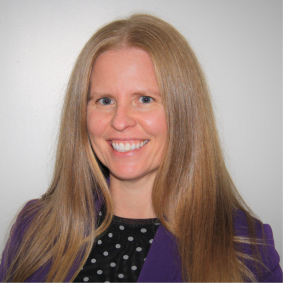Martine Isabelle
Master's degree in applied microbiology (2008)
Senior advisor, cross-disciplinary scientific projects, Vice-présidence aux affaires scientifiques, Institut national de santé publique du Québec
“What I remember about INRS is that I wasn't just a number. The human relations and the feeling of closeness are precious things, which distinguish this university from the biggest institutions.”
Martine's career has been marked by the importance of interdisciplinarity for society. INRS alumni, she has transformed her love of biology and passion for communication into a career marked by innovation and commitment. Whether working in a research group, in the exhibition rooms of the Musée Armand-Frappier or in a center of expertise at the forefront of public health in Quebec, Martine is committed to building bridges between disciplines, experts and the general public.
Before coming to INRS, Martine completed a bachelor's degree in biology at UQAM, where problem-based learning in small groups made her aware of the importance of interdisciplinary and collaborative work. It was during the summer, between her second and third years, that she discovered INRS by taking part in a research internship at the Laval campus. Seduced by the human scale of the institution and the proximity with professors, she decided to undertake a Master's degree in Applied Microbiology. “I remember being struck by the collaboration and community spirit within the research groups,” she confides.
Her research focused on the biotreatment of pig manure, a source of endocrine disruptors. This project, aimed at finding a solution to a complex environmental issue, immersed her in interdisciplinary collaboration at the crossroads of microbiology, molecular biology, toxicology, chemistry and engineering. The project enabled her to familiarize herself with a variety of methodologies, while working with specialists from diverse backgrounds. “It was fascinating: I could touch on lots of scientific disciplines while gaining a global understanding and learning to communicate with experts in fields very different from my own.”
Her years at INRS left an indelible mark on her career. Above and beyond her technical skills, Martine remembers above all the lessons of interdisciplinarity and collaboration, values that continue to guide her career. She also remembers the strong human bonds she forged with both fellow students and professors, creating a stimulating environment where everyone knew each other on a first-name basis. “What I remember about INRS is that I wasn't just a number. Human relations and the feeling of closeness are precious things, which set this university apart from the biggest institutions.”
After completing her degree, Martine found her calling in science communication at the Musée de la santé Armand-Frappier, located near the INRS campus in Laval. For 14 years, she and her colleagues developed exhibits and educational activities designed to make science accessible to the general public. Through her work, she has sought to build bridges between science and society, drawing on scientific rigor to produce clear, engaging content.
In 2021, with the COVID-19 pandemic in full swing, Martine chose to take on a new challenge by joining the Institut national de santé publique du Québec (INSPQ). As an executive advisor, she first contributed to an interdisciplinary project for genomic vigilance of SARS-CoV-2 variants, mobilizing epidemiologists, bioinformaticians and genomics specialists. Since 2022, she has been leading cross-disciplinary scientific projects, including the development of a five-year scientific program on the major public health issues on the Institute's radar. These responsibilities enable her to put to good use the skills she acquired at INRS, notably her ability to collaborate with experts from diverse backgrounds, and to lead large-scale projects with autonomy and efficiency.
Martine attributes much of her professional success to her time at INRS, where she learned the importance of combining academic rigor with collaboration. She recommends that current students take full advantage of the opportunities available to them. “Yes, the Master's project is central, but extra-university experiences play a crucial role. It's often there that we develop the management, communication and interpersonal skills that serve us well throughout our careers.”
Today, Martine continues her commitment to public health with the same desire to make a concrete contribution to improving collective health and well-being. By collaborating with experts and reflecting on the major challenges of tomorrow, she remains true to the spirit that has driven her since her early days at INRS: putting science at the service of the common good.
[Interviewed in January 2025.]

